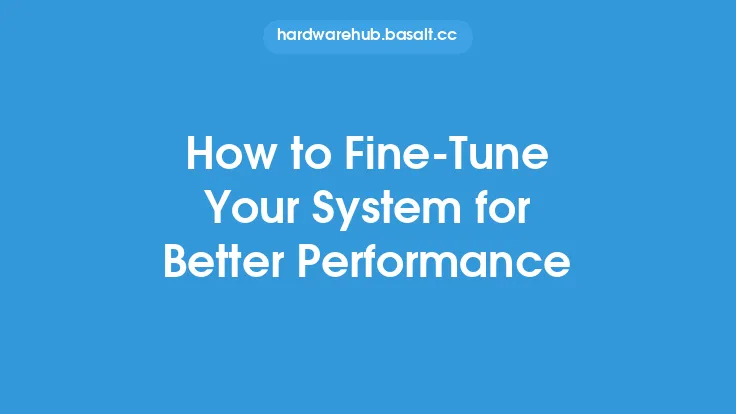When it comes to upgrading a computer, the goal is often to achieve maximum performance gain while minimizing cost and effort. However, with so many components to consider, it can be difficult to determine which upgrades will have the greatest impact. To prioritize upgrades effectively, it's essential to understand the relationships between different components and how they contribute to overall system performance.
Understanding System Bottlenecks
A system bottleneck occurs when one component is limiting the performance of the entire system. For example, a slow hard drive can bottleneck a fast processor, preventing it from reaching its full potential. To identify bottlenecks, it's necessary to monitor system performance and identify areas where upgrades will have the greatest impact. This can be done using benchmarking tools, such as 3DMark or Cinebench, which provide detailed information about system performance and identify areas for improvement.
Evaluating Component Interdependencies
Computer components are highly interdependent, and upgrading one component can have a significant impact on others. For example, upgrading a processor can require a corresponding upgrade to the motherboard, as the new processor may not be compatible with the existing board. Similarly, adding more memory can require a 64-bit operating system to take full advantage of the additional capacity. Understanding these interdependencies is crucial to prioritizing upgrades effectively and avoiding costly mistakes.
Assessing Upgrade Costs and Benefits
When evaluating potential upgrades, it's essential to consider both the cost and the potential benefits. Some upgrades, such as adding more memory or replacing a hard drive with a solid-state drive, can have a significant impact on system performance at a relatively low cost. Others, such as upgrading a processor or graphics card, can be more expensive and may require additional upgrades to supporting components. By carefully evaluating the costs and benefits of each potential upgrade, it's possible to prioritize those that will have the greatest impact on system performance.
Considering Future-Proofing
When prioritizing upgrades, it's also important to consider future-proofing. This involves selecting components that will remain relevant and effective for the longest period. For example, upgrading to a motherboard with a newer chipset can provide support for faster processors and memory, making it easier to upgrade in the future. Similarly, selecting a graphics card with a high level of scalability can ensure that it remains effective for gaming and other graphics-intensive applications for years to come.
Prioritizing Upgrades Based on Component Hierarchy
To prioritize upgrades effectively, it's helpful to consider the component hierarchy. This involves identifying the most critical components and upgrading them first. The typical hierarchy is:
- Processor: The processor is the brain of the system, and upgrading it can have a significant impact on overall performance.
- Motherboard: The motherboard provides the foundation for the system, and upgrading it can provide support for faster processors, memory, and other components.
- Memory: Adding more memory can provide a significant boost to system performance, especially for applications that require large amounts of memory.
- Storage: Upgrading to a faster storage solution, such as a solid-state drive, can provide faster loading times and improved overall performance.
- Graphics Card: Upgrading the graphics card can provide a significant boost to gaming and graphics performance.
- Power Supply: Upgrading the power supply can provide the necessary power for more demanding components, such as high-end graphics cards.
Conclusion
Prioritizing upgrades for maximum performance gain requires a careful evaluation of system bottlenecks, component interdependencies, and upgrade costs and benefits. By considering future-proofing and the component hierarchy, it's possible to identify the most critical upgrades and prioritize them effectively. Whether upgrading a gaming system, a workstation, or a general-purpose computer, a well-planned upgrade strategy can help achieve maximum performance gain while minimizing cost and effort.





